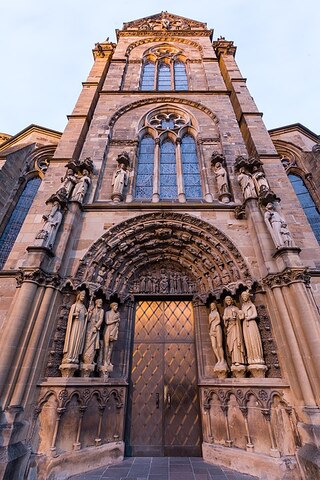 By Dietmar Rabich, CC BY-SA 4.0, https://commons.wikimedia.org/w/index.php?curid=42828301 By Dietmar Rabich, CC BY-SA 4.0, https://commons.wikimedia.org/w/index.php?curid=42828301 Hermann Schroeder (1904-1984) was a German composer, organist, conductor, and professor who spent the majority of his professional life in the Rheinland. As a Catholic church musician, he had a distinguished tenure as organist at Trier Cathedral, the oldest church in Germany with roots tracing back to the 3rd century. Schroeder's primary contribution in his sacred music output was to reintroduce medieval musical concepts to counter the prevailing Romantic influence of the day. This included the use of Gregorian chant, modal scales, the fauxbourdon (melody displayed in the tenor voice) combined with quartal/quintal harmonies and the occasional quasi-atonal approach characteristic of contemporary Paul Hindemith. Two choral preludes on German hymn tunes will be offered this Sunday morning. "Nun bitten wir den Heiligen Geist" (We Now Implore the Holy Ghost) opens the services with an invocation to the Spirit. The Baroque technique of placing the cantus firmus in the pedal with counterpoint figurations in the manuals is employed, albeit with quartal, quintal, and contemporary harmonies, which one would not expect to find in traditional 17th or 18th century music. "Schönster Herr Jesu" (Most beautiful Lord Jesus) also sets the melody in the pedal but the manuals play sustained suspension-filled passages reminiscent of the 19th century. The hymn tune is originally of Silesian origin but was paired with the German text (commonly known as "Fairest Lord Jesus") in 1842. The opening movement of Schroeder's Six Preludes and Intermezzi, Opus 9, "Praeludium," closes the services with a majestic soundscape reminiscent of medieval organum with modern tonalities weaved in throughout. At 11:00 a.m., the Chancel Choir offers Will Todd's "Lighting the Way," an anthem indicated as "A Song for Pilgrims" by the composer, who also wrote the text. He speaks to God being the Light of our own lives and how we then share that light with others, lighting their way.
0 Comments
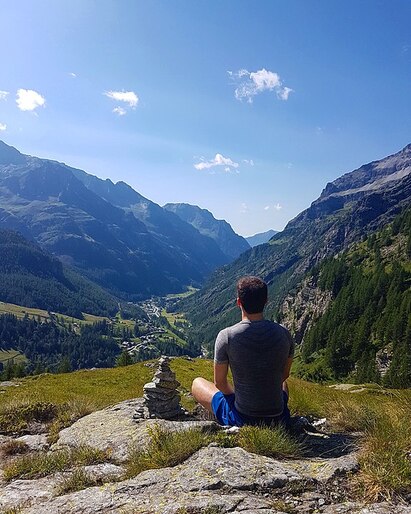 By Marcobergonzi1994 - Own work, CC BY-SA 4.0, https://commons.wikimedia.org/w/index.php?curid=69973237 By Marcobergonzi1994 - Own work, CC BY-SA 4.0, https://commons.wikimedia.org/w/index.php?curid=69973237 This Sunday morning we hear music exemplifying consolation, peace, and hope in these difficult days in our country and around the world. Our somber yet hopeful plea to God is reflected in "Soliloquy" by David Conte at the prelude. Composed in 1997, the work begins and ends in a plaintive single voice with a grand chorus of sound between. "Chant de paix" (Song of Peace) by Jean Langlais sets a calm, ethereal, even healing tone during the 11:00 a.m. offertory. J.S. Bach's "Komm, Gott Schöpfer, Heiliger Geist" (Come, God Creator, Holy Ghost) from his Great Eighteen Choral Preludes, composed in the last decade of his life, closes the services by invoking the Spirit. The Plymouth Ringers offer a hauntingly serene setting of the ancient tune Picardy by Sandra Eithun entitled "Let All Mortal Flesh Keep Silence." While primarily a Eucharistic text, a message of hope is also revealed: Christus vincit. At 11:00 a.m., the Chancel Choir will lead us in the final hymn, "All Our Hope in God is Founded" with a glorious setting by Michael Burkhardt. At the 6:00 p.m. Service of Ordination, "The Ground" by Ola Gjeilo will serve as the musical centerpiece with a string quartet and Bobby Brannock on piano accompanying. Based on a chorale from the final movement of Gjeilo's "Sunrise Mass" (2008), the work is intended to convey a sense of, in the composer's words, "reaching a kind of peace and grounded strength after the long journey of the mass...". 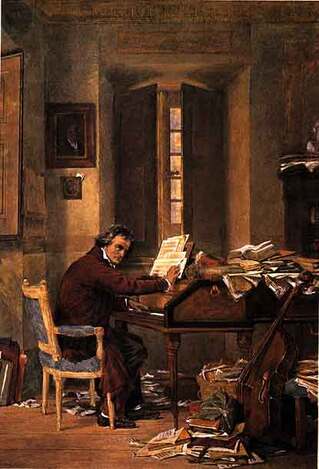 By Carl Schloesser - http://fi.wikipedia.org/wiki/Kuva:Beethovenhome.JPG (original source: http://www.musicwithease.com/beethoven-pictures.html), Public Domain, https://commons.wikimedia.org/w/index.php?curid=3556156 By Carl Schloesser - http://fi.wikipedia.org/wiki/Kuva:Beethovenhome.JPG (original source: http://www.musicwithease.com/beethoven-pictures.html), Public Domain, https://commons.wikimedia.org/w/index.php?curid=3556156 Ludwig van Beethoven, Franz Liszt, and Anton Bruckner are 19th century composers known to most listeners as producing sprawling symphonies, quintessential piano works, and choral masterworks. This Sunday morning, we will hear examples of their, for most, little known organ works. Beethoven wrote only three published works specifically for organ, two of which are part of opus 39: "Prelude Through All Major Keys". As the title implies, the work seamlessly moves through all twelve key signatures before returning to C major. Opus 39 was composed when he was only nineteen. Liszt's large scale organ works are pinnacles of the repertoire to organphiles but is overshadowed by his piano output to the general public. Liszt's gentle "Adagio in D Flat" will be offered at the 9:00 communion service. Bruckner was a renowned organ improviser in the latter half of the 19th century but composed very few works for what was his favorite instrument. His "Postlude" (or Nachspiel) will close the services in an ode to the Baroque era. The Chancel Choir offers a rousing setting of the spiritual "Standing in the Need of Prayer" at the 11:00 a.m. choral service by Moses Hogan. Hogan arranged dozens of spirituals for chorus in such creative and exciting ways before his untimely death in 2003. A vocal trio of Karen Dawson, Jennifer Stimson, and Andrea Weidemann are featured in this fun uplifting work. At 6:00 p.m., come join us for a service on the labyrinth! Bobby will lead us in song as we together come and find the quiet center in the Spirit. Two famous cousins from the Baroque era frame the morning services with chorale preludes based on two well-known hymn tunes.
Johann Sebastian Bach (1685-1750) composed several settings of "Liebster Jesu, wir sind hier" (Dearest Jesus, we are here). This week, we hear BWV 731, the ornamented four-voice chorale setting with soprano played with the right hand, alto and tenor in the left, and bass in the pedal. The Johann Gottfried Walther (1684-1748) setting of "Lobe den Herren, den mächtigen" (Praise to the Lord, the Almighty) also utilizes four voices but in a quasi-fugal style. Fragments of the hymn tune become the unifying motive throughout the brief chorale prelude.with large reeds in the pedal exclaiming the jubilant melody in its entirety. During the 9:00 a.m. communion service, a setting of the 13th century Eucharistic hymn by Thomas Aquinas, "Adoro te devote" (I devoutly adore you), will be offered by 20th century British-Canadian composer Healey Willan. At 11:00 a.m., the Chancel Choir sings the evocative anthem "I Believe" by composer Mark Miller. The text is based on an anonymous poem found written on a cellar wall in Cologne, where jewish citizens purportedly spent years in hiding from the Nazis during World War II. The paraphrased text reads: "I believe in the sun, even when it's not shining. I believe in love, even when I don't feel it. I believe in God, even when God is silent." May these words of faith, hope, and comfort empower us in these difficult days as well. At 6:00 p.m., Bobby and Blair are joined by resident Plymouth ukulele guru Stuart Yoshida, bassist Peter Strening and steel guitarist Chris Kennison for an eclectic selection of spiritual and sacred songs featuring a taste of the "Sacred Steel" tradition. Come and experience this unconventional service of evening prayer and unique sounds! |
Details
|
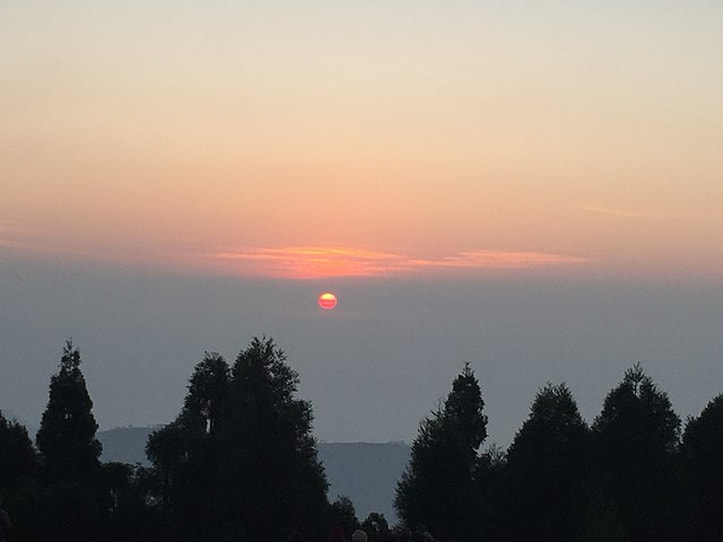
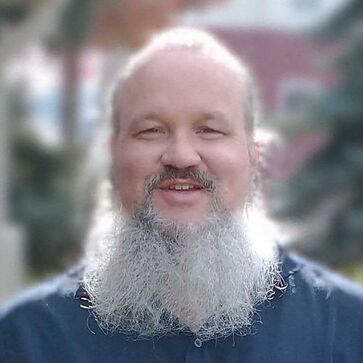
 RSS Feed
RSS Feed